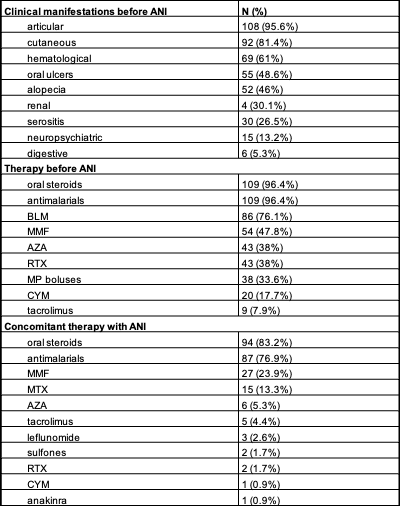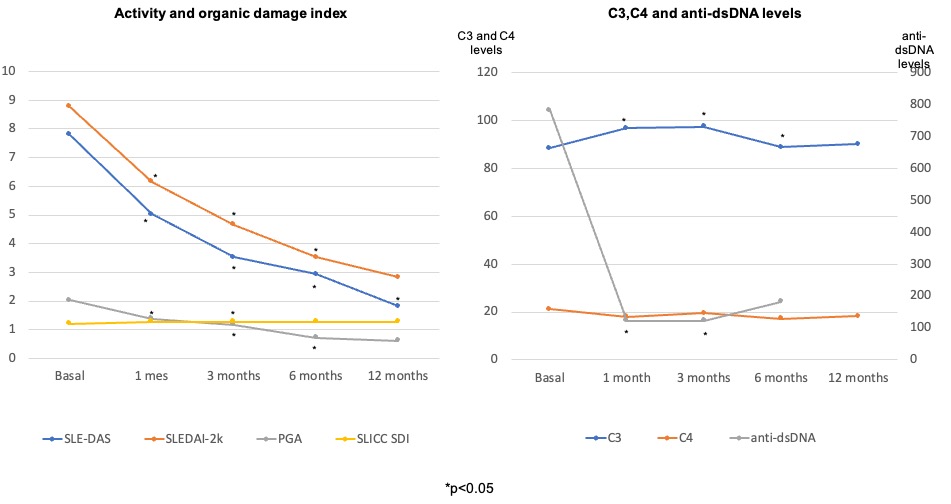Session Information
Date: Sunday, November 17, 2024
Title: SLE – Treatment Poster II
Session Type: Poster Session B
Session Time: 10:30AM-12:30PM
Background/Purpose: Anifrolumab (ANI) is a human monoclonal antibody that binds to the type I interferon receptor subunit 1 (IFNAR1), thus blocking the biological activity of type I interferon. ANI was approved by Spanish authorities on June 1, 2023, for the treatment of adults with moderate to severe systemic lupus erythematosus (SLE) with positive autoantibodies, in combination with standard treatment.
Objectives: To describe the clinical practice of ANI in SLE in Spain, reviewing a) the profile of patients receiving ANI, b) effectiveness, and c) safety.
Methods: Descriptive, retrospective, multicenter study of patients diagnosed with SLE according to EULAR/ACR 2019, SLICC, and/or ACR 1997 diagnostic criteria. Data were collected from medical records up to January 2024. Demographic, clinical, and laboratory variables, previous and concomitant therapy, activity indices (SLE-DAS, SLEDAI-2k, PGA), organ damage index (SLICC SDI), and safety were evaluated.
Results: A total of 113 patients (99 females / 14 males), mean age 44.6 ± 11.18 years (range 15-70 years) (47 hospitals) were included. Baseline characteristics of patients and previous treatment before ANI are summarized in the table.
The main reason for starting ANI was clinical/activity: cutaneous (n=72, 63.7%), articular (n=61, 53.9%), hematological (n=29, 25.6%), corticosteroid dependence (n=5, 4.4%), renal (n=2, 1.7%), serious adverse events with belimumab (BLM) (n=2, 1.7%), serositis (n=1, 0.9%), neurological (n=1, 0.9%), and Kikuchi disease (n=1, 0.9%).
All patients received 300 mg/4 weeks of ANI except one patient with renal involvement who received a loading dose (900 mg/4 weeks x3 months followed by 300 mg/4 weeks).
52.2% of patients received concomitant treatment with corticosteroids and/or antimalarials only. The remaining 47.8% received the following concomitant immunosuppressants with ANI: mycophenolate mofetil (MMF) (n=29), methotrexate (MTX) (n=15), azathioprine (AZA) (n=6), tacrolimus (n=5), rituximab (RTX) (n=3), leflunomide (LFN) (n=2), cyclophosphamide (CYM) (n=1), sulfones (n=2), and anakinra (n=1).
Significant, rapid improvement (from the 1st month) was observed in a) activity (SLE-DAS, SLEDAI-2k, PGA); as well as b) serological (decrease in anti-DNA antibody titers, increase in C3 and C4 levels) (Figure). The organ damage index remained stable.
After a mean follow-up of 4.4 ± 3.5 months, the main observed adverse effects were: herpes zoster (n=3), headache (n=3), arterial hypotension (n=2), hidradenitis suppurativa (n=2), influenza A pneumonia (n=1), skin reaction (n=1), herpes simplex virus infection, and urinary tract infection (n=1). In follow-up, 8 patients discontinued treatment due to primary failure (n=4), secondary failure (n=2), severe pneumonia (n=1), arterial hypotension (n=1).
Conclusion: To our knowledge, this series is the largest of ANI in patients with SLE in clinical practice showing effectiveness and safety data. We observed rapid effectiveness in severe and refractory patients; ANI was even used in combination with other biological therapies. The safety profile was acceptable with the limitation of short follow-up. These preliminary data should be confirmed in larger series with longer follow-up.
Abbreviations in alphabetical order: ANI: anifrolumab; AZA: azathioprine; BLM: belimumab; CYM: cyclophosphamide; MMF: mycophenolate mofetil; MP: methylprednisolone; MTX: Methotrexate; RTX: rituximab
To cite this abstract in AMA style:
Secada Gómez C, Calvo-Rio V, Retuerto Guerrero M, Font J, Casafont-Sole I, Mayo-Juanatey A, Alegre Sancho J, Freites Nuñez D, Hormigos C, Garrido-Puñal N, GONZALEZ ARRIBAS G, García-Valle A, Miguelez Sanchez J, Ibáñez Martínez M, Lozano Morillo F, García Manzanares Á, Sandoval-Moreno S, Cortés-Hernández J, Palma D, Lojo Oliveira L, CERVANTES PEREZ E, COLLADO P, Arciniega Larios C, Sala Icardo L, Labrador-Sánchez E, Peralta Ginés C, Plaza-Aulestia N, Medina Malone M, Rosas-Gómez de Salazar J, Corteguera M, Cebrián L, Anton Pages F, LAMUA RIAZUELO J, Fábregas canales m, Alados Hernández M, Garijo Bufort M, Pamies Corts A, Sarabia De Ardanaz L, Aguirre-del-Pino R, Cabezas Lefler J, Seijas-Lopez Á, Carrasco-Cubero C, López-Cerón Cofiño A, Ortiz-Santamaria V, Castañeda S, Laiño Piñeiro M, Ordás Calvo C, Arconada Lopez C, Bejerano C, Blanco-Alonso R, URRUTICOECHEA A, Garcia-Magallon B, Acosta Alfaro A, Leal Rodriguez S, Salido Olivares M, Lavilla P. Anifrolumab in Systemic Lupus Erythematosus. Spanish National Registry in a Real-world Setting [abstract]. Arthritis Rheumatol. 2024; 76 (suppl 9). https://acrabstracts.org/abstract/anifrolumab-in-systemic-lupus-erythematosus-spanish-national-registry-in-a-real-world-setting/. Accessed .« Back to ACR Convergence 2024
ACR Meeting Abstracts - https://acrabstracts.org/abstract/anifrolumab-in-systemic-lupus-erythematosus-spanish-national-registry-in-a-real-world-setting/


